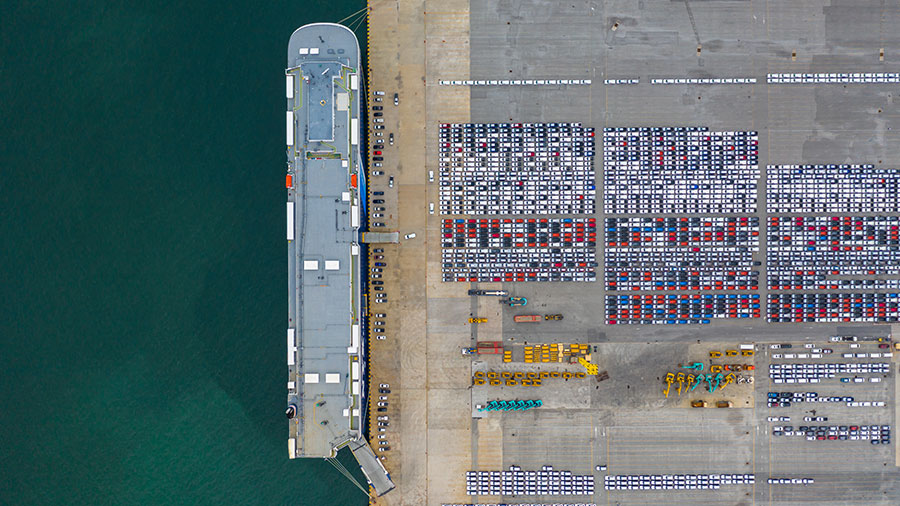

Gradually, Turkey imposed a 40% tariff on imported Chinese cars
Western countries have always been extremely bad towards China, the organization represented by the European Union has just passed the decision to impose tariffs on Chinese electric vehicles, Turkey has also announced tariffs on some imported products from China, Russia, India and Japan, especially the highest tariffs on Chinese products.
In the first three quarters, China exported 757.83 billion yuan of electric vehicles, lithium batteries and photovoltaic products, accounting for 4.1% of China's total export value. The export market of "new three kinds" covers more than 200 countries and regions, occupying a pivotal position in the world.
Sungreen Logistics quoted Lu Daliang, director of the Statistical analysis Department of the General Administration of Customs, "We believe that at present, the global new energy industry is still in the stage of rapid development, China's exports of" new three "and other green low-carbon products not only enrich the global supply, ease the global inflation pressure," It has also made great contributions to the global response to climate change and green transformation. It is true that some countries have imposed tariffs on China's "new three" products. We believe that this is unfair, non-compliant and unreasonable trade protectionism, which will ultimately affect the global green and low-carbon transition process. Some scholars in the United States believe that imposing tariffs on Chinese green technology products is a "stupid mistake." We hope that relevant countries can give up wrong practices, seek their own legitimate interests in common development, open up new sources of power for global economic growth, and jointly address the global challenge of climate change."
Wessel Ayan, secretary general of the Turkish Steel Producers Association (TCUD), told Reuters that the recently implemented tariffs affected about 4 million tons of imported steel products, whose value is estimated at between $2 billion and $2.2 billion.
According to the Official Gazette, after a complaint from Turkey's domestic steel producers, the relevant authorities conducted an investigation into the import of hot-rolled coils. The findings show that the practice of so-called "steel dumping" poses a threat to domestic steel production.
According to the decision, tariffs of 15 to 43 percent will be imposed on imports from China, while tariffs of 6 to 9 percent will be imposed on imports from Russia, India and Japan. These anti-dumping duties will be in addition to the 15% and 13% duties previously imposed on non-alloy hot coils and alloy hot coils, respectively.
In the field of electric vehicles, Turkey announced in March 2023 an additional 40% additional tariff on electric vehicles imported from China, and on June 8 extended the scope of this additional tariff to fuel and hybrid passenger vehicles. As the seventh largest automobile manufacturer in Europe, Turkey's automobile industry plays an important role in the national economy. However, the Turkish auto industry has few independent brands, and many European auto brands have set up subsidiaries and factories in Turkey.
Within 24 hours, more than 1,000 netizens participated in the vote and expressed their views, and more than 73% of netizens made it clear that they opposed Turkey's tariffs on Chinese auto products, believing that this will weaken the confidence of Chinese auto companies in the Turkish market and may lead to future investment in other countries.
Netizens participating in the poll generally believe that Chinese cars are better than European imported cars in terms of cost performance, and the imposition of tariffs will make it difficult for ordinary people to enjoy cost-effective products. Some netizens commented, "Raising tariffs will not improve the competitiveness of Turkish products, but will destroy Turkey's manufacturing industry." "After raising taxes, only the rich can enjoy such good auto products." "Turkey's tariff increase on Chinese auto products is supporting the unipolar world of NATO and the United States."
At the same time, Turkey's electric vehicle market is growing rapidly. According to the Turkish Automobile Distributors and Mobility Association (ODMD), sales of all-electric vehicles in Turkey surged 94.7 percent to 47,032 units in the first eight months of this year, and the proportion of electric vehicles in total sales increased to 7.8 percent from 4.1 percent in the same period last year. Among them, Togg ranks first in the domestic electric vehicle market with sales of nearly 15,000 units.
Some industry insiders pointed out that Turkey does not mainly produce traditional fuel vehicles, and the high tariffs it imposed on electric vehicles imported from China did not significantly protect the domestic industry. The intensity of such repressive measures against China is even greater than that of the EU, which calls into question the real intention behind it.

In the first three quarters, China exported 757.83 billion yuan of electric vehicles, lithium batteries and photovoltaic products, accounting for 4.1% of China's total export value. The export market of "new three kinds" covers more than 200 countries and regions, occupying a pivotal position in the world.
Sungreen Logistics quoted Lu Daliang, director of the Statistical analysis Department of the General Administration of Customs, "We believe that at present, the global new energy industry is still in the stage of rapid development, China's exports of" new three "and other green low-carbon products not only enrich the global supply, ease the global inflation pressure," It has also made great contributions to the global response to climate change and green transformation. It is true that some countries have imposed tariffs on China's "new three" products. We believe that this is unfair, non-compliant and unreasonable trade protectionism, which will ultimately affect the global green and low-carbon transition process. Some scholars in the United States believe that imposing tariffs on Chinese green technology products is a "stupid mistake." We hope that relevant countries can give up wrong practices, seek their own legitimate interests in common development, open up new sources of power for global economic growth, and jointly address the global challenge of climate change."
Wessel Ayan, secretary general of the Turkish Steel Producers Association (TCUD), told Reuters that the recently implemented tariffs affected about 4 million tons of imported steel products, whose value is estimated at between $2 billion and $2.2 billion.
According to the Official Gazette, after a complaint from Turkey's domestic steel producers, the relevant authorities conducted an investigation into the import of hot-rolled coils. The findings show that the practice of so-called "steel dumping" poses a threat to domestic steel production.
According to the decision, tariffs of 15 to 43 percent will be imposed on imports from China, while tariffs of 6 to 9 percent will be imposed on imports from Russia, India and Japan. These anti-dumping duties will be in addition to the 15% and 13% duties previously imposed on non-alloy hot coils and alloy hot coils, respectively.
In the field of electric vehicles, Turkey announced in March 2023 an additional 40% additional tariff on electric vehicles imported from China, and on June 8 extended the scope of this additional tariff to fuel and hybrid passenger vehicles. As the seventh largest automobile manufacturer in Europe, Turkey's automobile industry plays an important role in the national economy. However, the Turkish auto industry has few independent brands, and many European auto brands have set up subsidiaries and factories in Turkey.

Within 24 hours, more than 1,000 netizens participated in the vote and expressed their views, and more than 73% of netizens made it clear that they opposed Turkey's tariffs on Chinese auto products, believing that this will weaken the confidence of Chinese auto companies in the Turkish market and may lead to future investment in other countries.
Netizens participating in the poll generally believe that Chinese cars are better than European imported cars in terms of cost performance, and the imposition of tariffs will make it difficult for ordinary people to enjoy cost-effective products. Some netizens commented, "Raising tariffs will not improve the competitiveness of Turkish products, but will destroy Turkey's manufacturing industry." "After raising taxes, only the rich can enjoy such good auto products." "Turkey's tariff increase on Chinese auto products is supporting the unipolar world of NATO and the United States."
At the same time, Turkey's electric vehicle market is growing rapidly. According to the Turkish Automobile Distributors and Mobility Association (ODMD), sales of all-electric vehicles in Turkey surged 94.7 percent to 47,032 units in the first eight months of this year, and the proportion of electric vehicles in total sales increased to 7.8 percent from 4.1 percent in the same period last year. Among them, Togg ranks first in the domestic electric vehicle market with sales of nearly 15,000 units.
Some industry insiders pointed out that Turkey does not mainly produce traditional fuel vehicles, and the high tariffs it imposed on electric vehicles imported from China did not significantly protect the domestic industry. The intensity of such repressive measures against China is even greater than that of the EU, which calls into question the real intention behind it.





